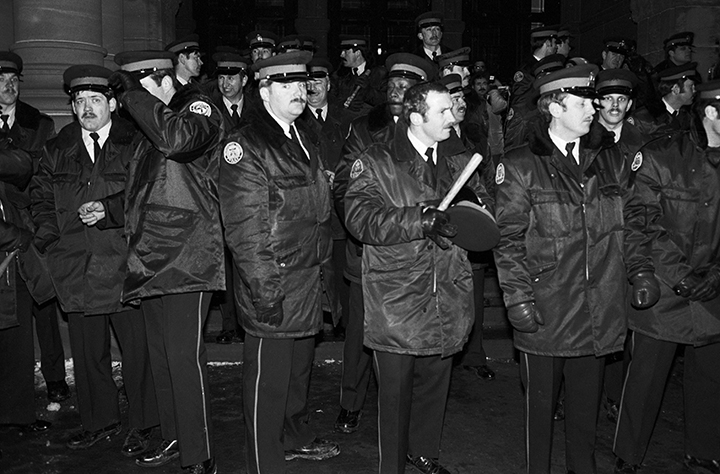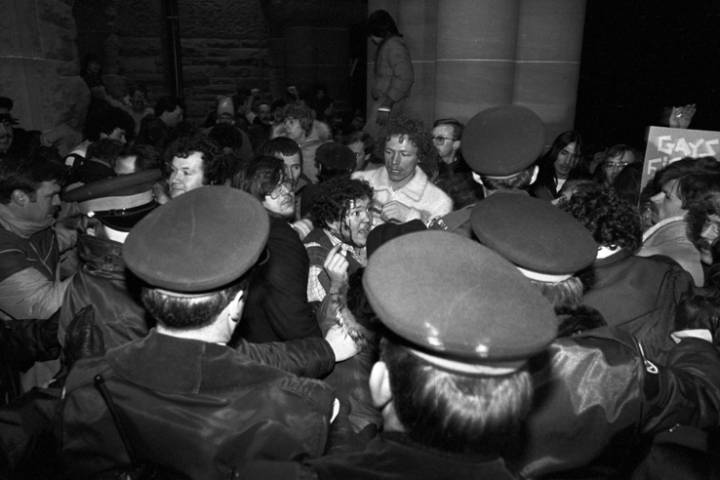Toronto police will issue an apology for the controversial 1981 bathhouse raids that saw hundreds of men arrested, thousands of dollars in property damage and widespread protests throughout the city — a watershed moment one researcher says led to the formation of the modern Canadian Pride movement.

Police Chief Mark Saunders will issue the apology, 35 years after the raids took place, on Wednesday evening during a Pride reception at police headquarters.
On Feb. 5, 1981, 150 plain-clothed and uniformed police officers raided four bathhouses after a six-month investigation dubbed “Operation Soap” — which led to close to 300 arrests.
READ MORE: 6,000 Canadians would be covered by gay pardon decision
Retired Laurentian University professor Gary Kinsman, a researcher with the We Demand An Apology Network, said the raids were part of a series of targeted attacks at the time that included the laying of bawdy house related charges across the country.
“An apology should have been delivered a long, long, long time ago,” he told Global News in a telephone interview from Scotland.
“Many people’s lives were ruined and they experienced major harm as a result of those raids; many people were outed against their will, many people experienced all forms of stigmatization and discrimination so I think there’s other forms of redress that need to be addressed here.”
Kinsman said the raids, and the resulting protests a day later that saw more than 1,000 people to take the streets, helped to form the modern Pride movement in Toronto.
“It actually led to the major expansion and explosion of gay and to a certain extent lesbian community formations in Toronto, leading to many of the things that now currently exist,” he said.
“The other criminal code offences have been used against consensual homosexual sex, those people who were charged for those things need to be apologized to as well,” he said.
“An official apology coming from the chief of police is a useful first step but there’s an awful lot more that needs to be done.”
Pride Toronto have called the raids an “act of violence” and “a deliberate and organized campaign to push gay bathhouses out of business and silence gay voices” that saw “police verbally and physically abused patrons and staff.”
“If this is indeed an apology, then we should accept it at face value. That said, we can forgive, but we shouldn’t forget,” said Ken Popert, the president and CEO of Canada’s largest gay and lesbian media organization Pink Triangle Press.
“Really the apology ought to come from those individuals who planned the raids, abused their power and defended them afterwards. Otherwise, the raids remain misconduct without consequence. Those perpetrators are shielded by official silence and the lapse of decades.”
READ MORE: Liberals to review decades-old convictions of gay men under defunct laws
Kinsman said Toronto police were central to the “oppression and the regulation of gay men,” which is why the apology is so important to the LGBTQ community — but said “it’s only a first step.”
“It could have more content than simply being, ‘We apologize.’ But it’s not clear at this point and time whether it will do that,” he said.
Kinsman said the targeting of homosexuals in Toronto “didn’t stop in 1981” and there were many raids and charges that led up to Feb. 5, 1981, which speaks to the need for a broader apology.
“Many of those people who were convicted, those people actually need to have those convictions expunged if they haven’t been already. They need to have full exoneration,” he said.
“These people were engaging in consensual sexual activities — there was no reason at all for them to be charged and there’s a lot more that needs to be done than simply an official apology from the chief of police.”
Kinsman and the We Demand An Apology Network have also called for apologies from the federal government to public service employees and military service members who faced intense scrutiny and discrimination they faced up until 1992, when the Canadian Armed Forces repealed regulations requiring military members suspected of being homosexual to be released from active duty.
In February, The Canadian Press reported that the federal government planned to review all convictions for buggery and gross indecency.
Ottawa was also reported to have plans to pardon Everett Klippert, who spent years in prison in indefinite detention before his 1971 release after being convicted of consensual sexual acts between men.
Popert said the dark chapter in Toronto and Canadian history should stand as an important lesson for Canadians.
“The bathhouse raids, the political upheaval that followed and this apology should remind Canadians that police forces can grow too powerful, too political and too unaccountable for anyone’s good,” he said.





Comments